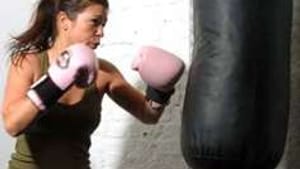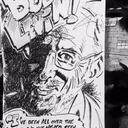Stay in the Loop
BSR publishes on a weekly schedule, with an email newsletter every Wednesday and Thursday morning. There’s no paywall, and subscribing is always free.
Take that, Fate! or: Boxing as therapy— and metaphor
Heart attack, Part 8: Putting on the gloves

Eighth in a series of articles about the author's heart attacks.
Since I completed cardio-rehab six months after open heart surgery, my routine had been 30 minutes of health club cardio-machines three days a week, alternating with three days of less cardio but two sets of light weights. I would have done a seventh day, but the therapist said, "Give your body a day off." The heavy punching bag hung in the corner, a six-foot apple.
I had only six decades' worth of rust to scrape off.
In 1951, after grade 4A, I spent the summer at Camp Omega in the West Philadelphia Jewish Community Center. My friends there — a scholarly bunch whom my left jab had regularly punished (or at least annoyed) across my living room floor— egged me into the ring with Georgie Reuben.
Georgie was a wise guy several inches shorter and six months younger than I: a wise guy, but one of the better athletes at Henry C. Lea Elementary, and his father, it turned out, had focused Georgie's education on more than long division. My friends cheered when the counselor raised Georgie's arm in victory.
Trailing the women
The cardio machines are in one room, with barbells, press benches and TechnoGym equipment in another. Another building houses the aerobics studio and Pilates. In my room, personal trainers massage clients, correct their Downward Facing Dogs, run them through TRX drills. The more martial trainers have their clients punch and kick the bag.
The weights in this room range from one to ten pounds. Here I feel no envy toward people grunting, sweating, hoisting their way through bigger numbers than mine. That some of the women patients are working with ten pounds— a gong I have yet to ring since my heart attacks— does not disturb me. Acceptance, I remind myself, is a good thing.
I enjoy my workouts. I recall when I couldn't lift the orange juice container, and so I appreciate my progress from five-pound weights to six to seven. I remember when my skin strung slack and grey over bone, and so I like seeing my body tighten and muscles build.
A right hook
But I kept an eye on those patients at the heavy punching bag. I liked the thwack when a blow landed well.
Before long I was going online: Googling "How to throw a jab?" "How to throw a hook?" and "How to throw an uppercut?" I took notes on three-by-five cards about foot placement, hip rotation, angle of arm at impact.
I studied myself in full-length mirrors. (Why, I wondered, is this man smiling?) I watched You Tube boxing videos. I experimented with boxing gloves.
On weight days I hit the punching bag. I found I still had my fourth-grade jab. Now, at age 70, I added a right hook. Soon I had developed a combination.
My left hook, however, was incapable of denting cream cheese, and each of my uppercuts threatened to fracture a wrist.
Like Sonny Liston
If this process didn't offer the possibility of mastery, it did offer improvement. Entering my eighth decade, this was no small achievement. Maybe even something to get a kick from.
My smile broadened; my step bounced with each outing. It was silly; it was purposeless; but do it enough, I reasoned, with pace and rhythm— without tripping over your feet or your exuberance— and you'll achieve beauty.
The punching bag even permitted the venting of rage. With each sharply expelled breath and snapping blow, I struck against a friend's malignant tumor, or another's damaged frontal lobe, or my own stent-dependent arteries. Take that, Fate, you bastard!
Although I'd been warned, my pace— whether flat-footed or on my toes— threatened to carry me into exhaustion. After each flurry of punches, I backed off, caught my breath, steadied my underpinnings. I worried that I would push my heart too far.
"We'll train you like Sonny Liston," my trainer said. "You'll end it early, or go out on your stool."
Boxing as metaphor
Joyce Carol Oates has written that life is a metaphor for boxing: When a bout goes on forever, and you and your opponent are evenly matched, "It's impossible not to see that your opponent is you."
Defend yourself at all times, Oates instructs, for you rarely see the blow that fells you. For someone who has been dropped— whether by an incoming right cross or his own bodily shortcomings— the challenge is to rise, shake off the cobwebs, and resume the contest with joy and vigor. Fear is never again absent; but knowledge, depth and profitable vision can be banked from the experience.
One afternoon, following an appointment with my cardiologist, my wife catches me studying the reviews of King's Gym on YELP. Its East Oakland neighborhood is dicey, its bags taped, its building worn cinder block; but Andre Ward, an Olympic and professional champion, trains there.
"Don't even think about it!" Adele says.
I tell myself, Stay focused! By 2016, the Super-Senior Maccabiah Games, a middleweight with your reach is a cinch to medal. Unless you draw Georgie Reuben in an early round.
♦
To read the preceding episode, click here.
To begin the series at the first episode, click here.
To read responses, click here.
To read the next episode, click here.
Since I completed cardio-rehab six months after open heart surgery, my routine had been 30 minutes of health club cardio-machines three days a week, alternating with three days of less cardio but two sets of light weights. I would have done a seventh day, but the therapist said, "Give your body a day off." The heavy punching bag hung in the corner, a six-foot apple.
I had only six decades' worth of rust to scrape off.
In 1951, after grade 4A, I spent the summer at Camp Omega in the West Philadelphia Jewish Community Center. My friends there — a scholarly bunch whom my left jab had regularly punished (or at least annoyed) across my living room floor— egged me into the ring with Georgie Reuben.
Georgie was a wise guy several inches shorter and six months younger than I: a wise guy, but one of the better athletes at Henry C. Lea Elementary, and his father, it turned out, had focused Georgie's education on more than long division. My friends cheered when the counselor raised Georgie's arm in victory.
Trailing the women
The cardio machines are in one room, with barbells, press benches and TechnoGym equipment in another. Another building houses the aerobics studio and Pilates. In my room, personal trainers massage clients, correct their Downward Facing Dogs, run them through TRX drills. The more martial trainers have their clients punch and kick the bag.
The weights in this room range from one to ten pounds. Here I feel no envy toward people grunting, sweating, hoisting their way through bigger numbers than mine. That some of the women patients are working with ten pounds— a gong I have yet to ring since my heart attacks— does not disturb me. Acceptance, I remind myself, is a good thing.
I enjoy my workouts. I recall when I couldn't lift the orange juice container, and so I appreciate my progress from five-pound weights to six to seven. I remember when my skin strung slack and grey over bone, and so I like seeing my body tighten and muscles build.
A right hook
But I kept an eye on those patients at the heavy punching bag. I liked the thwack when a blow landed well.
Before long I was going online: Googling "How to throw a jab?" "How to throw a hook?" and "How to throw an uppercut?" I took notes on three-by-five cards about foot placement, hip rotation, angle of arm at impact.
I studied myself in full-length mirrors. (Why, I wondered, is this man smiling?) I watched You Tube boxing videos. I experimented with boxing gloves.
On weight days I hit the punching bag. I found I still had my fourth-grade jab. Now, at age 70, I added a right hook. Soon I had developed a combination.
My left hook, however, was incapable of denting cream cheese, and each of my uppercuts threatened to fracture a wrist.
Like Sonny Liston
If this process didn't offer the possibility of mastery, it did offer improvement. Entering my eighth decade, this was no small achievement. Maybe even something to get a kick from.
My smile broadened; my step bounced with each outing. It was silly; it was purposeless; but do it enough, I reasoned, with pace and rhythm— without tripping over your feet or your exuberance— and you'll achieve beauty.
The punching bag even permitted the venting of rage. With each sharply expelled breath and snapping blow, I struck against a friend's malignant tumor, or another's damaged frontal lobe, or my own stent-dependent arteries. Take that, Fate, you bastard!
Although I'd been warned, my pace— whether flat-footed or on my toes— threatened to carry me into exhaustion. After each flurry of punches, I backed off, caught my breath, steadied my underpinnings. I worried that I would push my heart too far.
"We'll train you like Sonny Liston," my trainer said. "You'll end it early, or go out on your stool."
Boxing as metaphor
Joyce Carol Oates has written that life is a metaphor for boxing: When a bout goes on forever, and you and your opponent are evenly matched, "It's impossible not to see that your opponent is you."
Defend yourself at all times, Oates instructs, for you rarely see the blow that fells you. For someone who has been dropped— whether by an incoming right cross or his own bodily shortcomings— the challenge is to rise, shake off the cobwebs, and resume the contest with joy and vigor. Fear is never again absent; but knowledge, depth and profitable vision can be banked from the experience.
One afternoon, following an appointment with my cardiologist, my wife catches me studying the reviews of King's Gym on YELP. Its East Oakland neighborhood is dicey, its bags taped, its building worn cinder block; but Andre Ward, an Olympic and professional champion, trains there.
"Don't even think about it!" Adele says.
I tell myself, Stay focused! By 2016, the Super-Senior Maccabiah Games, a middleweight with your reach is a cinch to medal. Unless you draw Georgie Reuben in an early round.
♦
To read the preceding episode, click here.
To begin the series at the first episode, click here.
To read responses, click here.
To read the next episode, click here.
Sign up for our newsletter
All of the week's new articles, all in one place. Sign up for the free weekly BSR newsletters, and don't miss a conversation.

 Bob Levin
Bob Levin